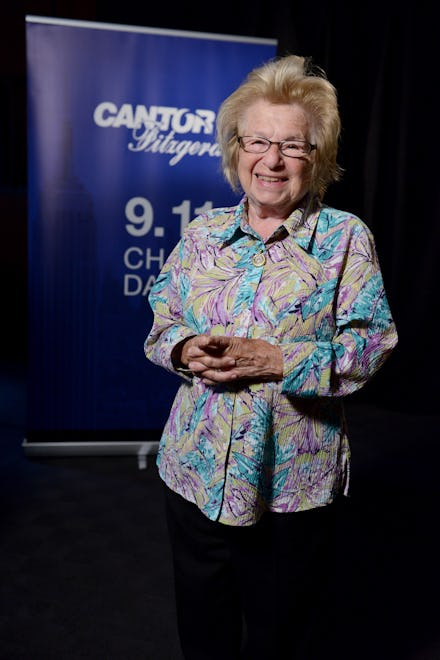In One Quote, Sex Expert Dr. Ruth Just Misunderstood Something Important About Consent

Everyone's favorite blowjob expert, Dr. Ruth Westheimer, is widely respected for her decades of sexual education. But the famed sex therapist recently made problematic statements in regards to consent.
In a radio interview Monday with the Diane Rehm Show, Dr. Ruth was discussing overtly sexual images in prime-time television when she veered offed onto another topic:
Flying in the face of what consent and anti-assault experts across the country assert, Dr. Ruth is stating we're actually not able to change our minds about having sex (and using rather flimsy, non-scientific texts to support her claim). In short, Dr. Ruth says, boners trump brains. She doubled down on her stance, as the Washingtonian noted, when Rehm pressed her to clarify the statement:
This isn't the first time Dr. Ruth has voiced this "anti-mind-changing" stance. She told Haaretz a few months ago "the idea of consent is nonsense. Except consent before they are naked in bed."
Dr. Ruth took to Twitter on Tuesday to clarify the quotes from the recent interview, stating that her comments don't endorse rape. But her response again rejected the ability of a person to change one's mind in bed:
To claim that "the brain flies out of the head" during sex is highly problematic when it comes to informed consent, particularly in the matter of campus sexual assaults that she addresses in the interview. The principle of "no means no" — or even better, "yes means yes" — isn't limited to a single moment of initiation, but rather is a decision that can be voiced over the course of a sexual encounter. As the brilliant brilliant tea metaphor that went viral in March pointedly illustrated, the option to change one's mind should never be off the table.
"Just because you agreed to do something sexually at one point, does not mean you have to continue doing it," Kate McCombs, a sex therapist, previously told Mic.
Dr. Ruth, who turns 87 on Thursday, is also a sex therapist, and a typically progressive one that. Her '80s radio and TV show, Sexually Speaking, was impressively ahead of its time as a frank and judgment-free space for sex advice, and she made a concerted effort to offer up pro-pleasure messages of female empowerment.
Her views on "changing one's mind" in the context of consent could use to change themselves — or at least viewed critically by her legions of listeners, as part of the ongoing conversation on what consent really looks like.
h/t Washingtonian